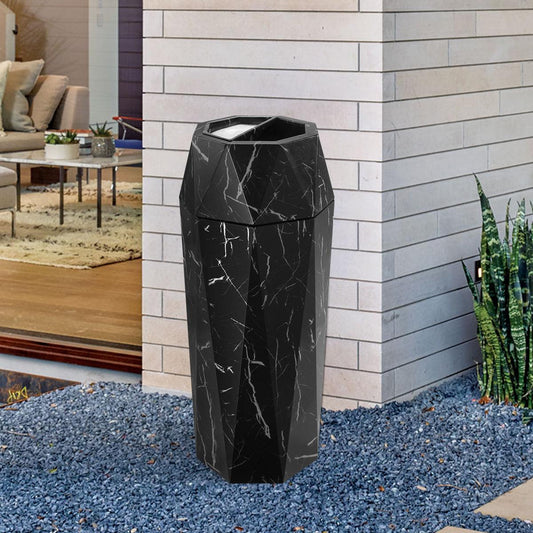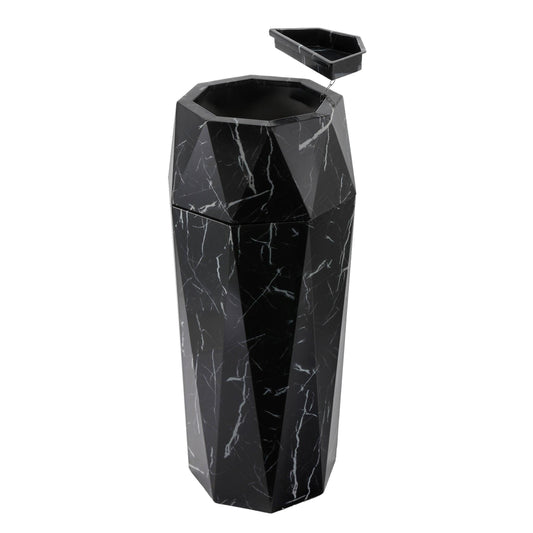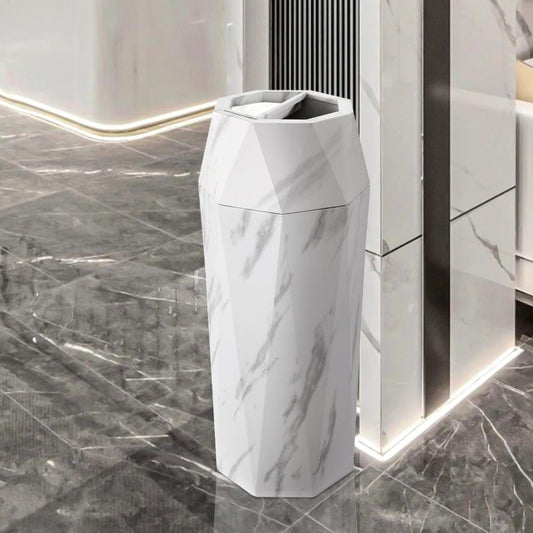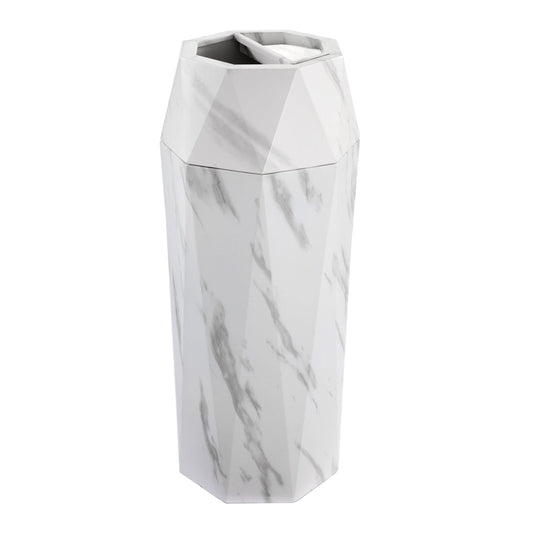Stainless Steel vs. Plastic Trash Cans: Which One is Better for Commercial Use?
Inside this Article:
- Durability and Lifespan
- Aesthetics and Brand Image
- Hygiene and Maintenance
- Cost and Budget
- Application Suitability
- Environmental Impact and Sustainability
- Industry Standards and Certifications
- Maintenance Best Practices
- Real-World Use Cases and Customer Feedback
- Future Trends in Trash Can Materials
- Conclusion
Introduction
Choosing the right trash can might seem simple, but for commercial environments like restaurants, hotels, malls, and office buildings, it's a decision that can significantly impact cleanliness, safety, and long-term costs. Among the most common options, stainless steel and plastic trash cans each offer different benefits — but which one is better for your business?
1. Durability and Lifespan
Stainless Steel:
Stainless steel trash cans are built to last. They resist dents, corrosion, and extreme temperatures, making them ideal for high-traffic and outdoor areas. A high-quality stainless steel bin can serve reliably for years with minimal wear.
Plastic:
Plastic bins are more prone to cracking, fading, and deformation over time, especially when exposed to sunlight or harsh cleaning chemicals. While they may be lightweight, they generally need to be replaced more frequently.
✅ Winner: Stainless Steel — Better durability and return on investment.
2. Aesthetics and Brand Image
Stainless Steel:
Sleek and modern, stainless steel bins enhance the look of commercial interiors, especially in premium venues like hotels and offices. They signal professionalism and attention to detail.
Plastic:
Plastic bins often look more utilitarian and may clash with upscale environments. While they come in many colors, they rarely offer the same visual appeal.
✅ Winner: Stainless Steel — Ideal for customer-facing or design-sensitive spaces.
3. Hygiene and Maintenance
Stainless Steel:
With smooth, non-porous surfaces, stainless steel bins are easy to clean and sanitize. Many are fingerprint-resistant or coated with antibacterial finishes, making them a hygienic choice.
Plastic:
Plastic can absorb odors and stain over time. Deep scratches may harbor bacteria, and frequent cleaning may not completely eliminate lingering smells.
✅ Winner: Stainless Steel — Easier to keep sanitary in public spaces.
4. Cost and Budget
Stainless Steel:
The upfront cost is higher. However, long-term durability often results in fewer replacements and reduced maintenance costs.
Plastic:
Lower initial investment, but potential long-term costs add up due to more frequent replacements and cleaning challenges.
✅ Winner: Depends — Choose plastic for short-term or low-traffic needs; stainless steel for long-term savings.
5. Application Suitability
- Hotels, Offices, and Shopping Malls: Stainless steel aligns with premium design and frequent use.
- Industrial Backrooms or Temporary Events: Plastic may suffice where aesthetics and longevity are not key priorities.
- Outdoor Areas: Stainless steel resists weathering better than plastic, especially when powder-coated.
✅ Winner: Stainless Steel — More versatile across diverse commercial settings.
6. Environmental Impact and Sustainability
In today’s eco-conscious world, choosing materials that support sustainability is more important than ever. Stainless steel trash cans offer significant environmental advantages compared to plastic:
- Recyclability: Stainless steel is 100% recyclable without loss of quality, enabling a circular lifecycle. In contrast, most plastics degrade after recycling or are downcycled into lower-value products.
- Longevity Reduces Waste: Longer service life means fewer bins discarded in landfills. Stainless steel bins can last decades, while plastic bins often need replacement every few years, increasing waste volume.
- Reduced Chemical Impact: Plastic manufacturing relies heavily on fossil fuels and involves additives that may leach toxins. Stainless steel production has a higher initial environmental footprint but tends to be cleaner during the product’s use phase.
Choosing stainless steel supports corporate social responsibility goals and appeals to eco-minded customers.
7. Industry Standards and Certifications
When selecting commercial trash cans, checking relevant certifications and standards ensures product quality and safety:
- ANSI/BIFMA Compliance: For durability and safety in commercial furniture and fixtures.
- NSF Certification: Indicates suitability for food service environments, ensuring hygienic design.
- ISO 14001 Environmental Management: Reflects manufacturer commitment to minimizing environmental impact.
Verifying certifications helps buyers avoid low-quality or non-compliant products.
8. Maintenance Best Practices
Proper maintenance extends trash can life and appearance. Avoid these pitfalls:
- Using Abrasive Cleaners: Harsh chemicals or steel wool can scratch stainless steel, reducing corrosion resistance. Use mild detergents and soft cloths.
- Neglecting Regular Cleaning: Accumulated grime fosters bacteria and odors; schedule routine cleaning.
- Ignoring Damage: Promptly repair dents or chips to prevent rust or contamination.
Following manufacturer guidelines preserves the investment and keeps bins looking new.
9. Real-World Use Cases and Customer Feedback
Businesses switching from plastic to stainless steel bins report:
- Reduced Replacement Frequency: Lower total cost of ownership.
- Improved Customer Perception: More positive feedback on facility cleanliness and professionalism.
- Easier Waste Management: Removable liners simplify emptying and cleaning.
These practical benefits reinforce stainless steel’s value beyond theory.
10. Future Trends in Trash Can Materials
Innovation continues in waste management solutions:
- Smart Trash Cans: Integrated sensors for fill-level detection and automated sorting.
- Bio-based Plastics: More sustainable but currently limited durability.
- Advanced Coatings: Antimicrobial or self-cleaning surfaces enhance hygiene.
Stainless steel remains a reliable base material, often combined with these technologies.
Conclusion
While plastic trash cans can work in certain situations, stainless steel trash cans clearly outperform when it comes to durability, hygiene, design, and long-term value. For businesses that prioritize quality, cleanliness, and brand presentation, stainless steel is the superior choice.
At Beamnova®, we specialize in commercial-grade stainless steel trash cans designed to meet the demands of real-world use. Explore our collection today and upgrade your waste management system with confidence.







